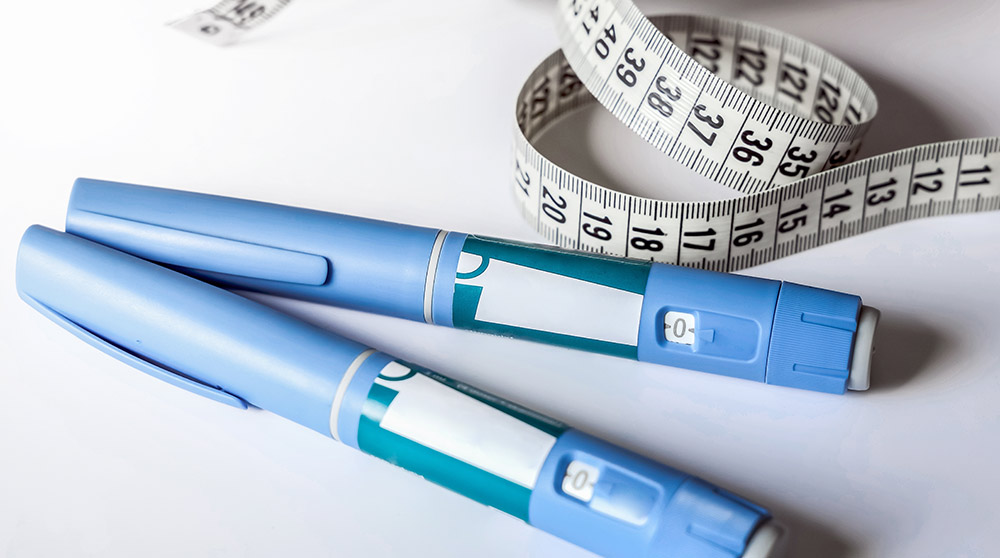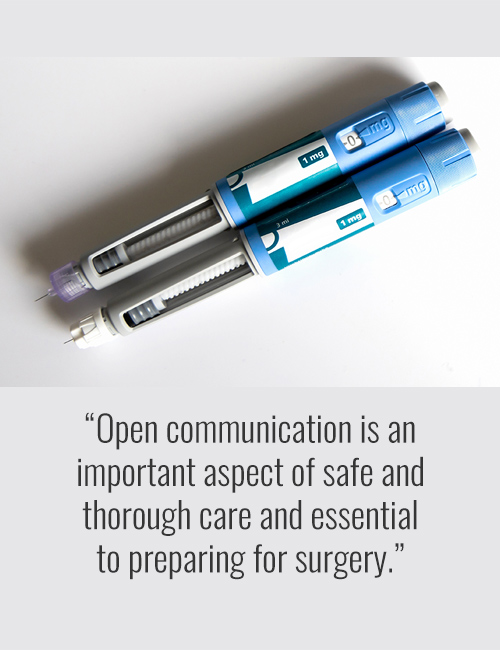Increased Ozempic® Risks With Anesthesia: What You Need to Know
Posted July 19, 2024 in Ozempic®, Prepare for Surgery

New research has shown that patients undergoing surgery who are also using weight loss shots like Ozempic® are at a greater risk for aspiration. This blog aims to share this research, educate readers on how GLP-1 RAs can affect the body, and provide guidelines for preparing for surgery while taking these medications.
4 Min Read:
Ozempic® and Anesthesia: A Potentially Dangerous Combination
Wanting to look and feel your best shouldn’t be in conflict, but that’s why it’s important to have full disclosure to different medical teams. New studies have shown a connection between an increased risk of aspiration for patients under anesthesia who also take popular weight-loss drugs like Ozempic® and Wegovy®. With these drugs’ proliferation and increased availability, it is crucial to stay current on new findings about how these medications may affect other aspects of the patient’s health and medical care.
At Chelsea Foot & Ankle, we try to take the conservative route whenever possible for our patients, but in some cases, surgery is a necessity. When an operation is imminent, our patients must be open about using Glucagon-like Peptide-1 receptor agonists (GLP-1 RAs) like Ozempic® so we can do our part to ensure a safe and effective procedure.
What Are GLP-1s and How Do They Affect Surgery?
You’re likely familiar with the brand names Ozempic® and Wegovy®, generically known as semaglutide. These medications are members of a family called glucagon-like peptide-1 receptor agonists, or GLP-1 RAs for short. Initially used for type-2 diabetes management, GLP-1 RAs provide secondary benefits for weight loss, such as decreased appetite and slower digestion, which keeps patients full for longer, making it much easier to lose weight.
This process specifically poses a potential complication when these same patients are put under anesthesia for any surgery: researchers have found that patients using GLP-1 RAs before their procedures are at a higher risk for operative aspiration. Aspiration is a condition that occurs when something, be it a liquid, solid, or some other substance enters the airway and, eventually, the lungs. In this case, aspiration is when the contents of the patient’s stomach enter the lungs, which is potentially very dangerous.
If you’ve ever had surgery, you likely know that your surgeon will require you to fast for a certain time before your operation so that your stomach contents are empty. While on Ozempic® or semaglutide, patients’ digestion is slower, meaning their stomach contents are not emptying at a normal rate, so they are at a higher risk of aspiration even when the patients follow their preoperative fasting guidelines.
How to Prepare for Surgery with Ozempic®
We’re staying up to date on the latest findings about the connection between Ozempic® and surgery, but for now, we are following NYU’s recommendations:
- For patients taking GLP-1 RAs daily for weight loss, they should stop taking their medication the day before surgery.
- Patients taking GLP-1 RAs weekly (like Ozempic®) for weight loss should stop taking their medication a week before surgery.
- Patients should see if there are special guidelines for when to fast before surgery when taking these medications.
Regardless of your dosage, procedure, or reason for taking these medications, you must always disclose your medical history and current medications with your surgeon before surgery.
Do I Need to Report Ozempic® Use for Minimally Invasive Procedures?

In short, yes. Although we always try to provide conservative, non-surgical treatment for our patients, with great success in many cases, such as with sprained ankles and bunions, we encourage our patients who take GLP-1 RAs to disclose this to our team. Even with some minimally invasive procedures that may only require a local anesthetic, like certain types of neuroma treatments, it is in the patient’s best interest to be open about their medication use.
In a broader sense, it is always a good idea to report medications to all of your physicians–even if they seem unrelated. Open communication is an important aspect of safe and thorough care and essential to preparing for surgery.
Our surgeons are here to make your procedure as safe and effective as possible, so don’t hesitate to ask questions or voice concerns. Your safety is our top priority, and we will always value honest communication between patient and provider.
Want to Learn More About Preparing for Surgery on Ozempic®?
Our team at Chelsea Foot & Ankle is committed to providing honest, compassionate care to all of our patients–and part of this commitment means staying at the forefront of medical research and communicating relevant changes with our patients.
From hammertoe surgery to sports injuries, we provide boutique care with integrity–call Chelsea Foot & Ankle today at (646) 929-4149 to schedule a consultation or ask us for more information on how to prepare for your surgery while on Ozempic®.
We look forward to hearing from you!
